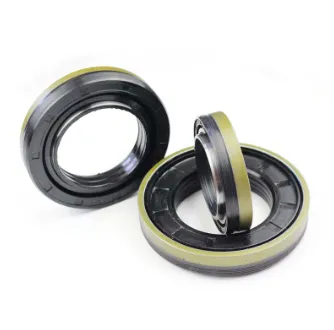Complete Protection in Harsh Conditions: A Deep Dive into Cassette Seals
In demanding environments like agriculture, construction, and heavy-duty transport, conventional oil seals often fall short. That's where the cassette seal comes into play. Engineered for long service life under severe conditions, these seals offer advanced protection against contamination, leakage, and wear. This article explores what cassette oil seals are, their benefits, how to select from a cassette seal catalog, and what to look for in a reliable cassette seals manufacturer.

What Is a Cassette Seal and How Does It Work?
A cassette seal also known as a seal cassette, is a multi-lip, unitized seal designed to protect rotating components, such as wheel hubs, axles, and transmissions, from both external contaminants and internal lubricant leakage.
Unlike traditional oil seals, a cassette oil seal combines multiple sealing elements and sometimes even integrated wear sleeves within a single housing. This design reduces installation errors and offers significantly better protection in dirty, abrasive environments.
Core components of a cassette seal include:
Primary sealing lip for lubricant retention
Dust lip(s) to exclude contaminants
Internal labyrinth paths for enhanced sealing
Pre-lubricated interior for initial protection
Cassette seals are widely used in:
Agricultural equipment like tractors and harvesters
Heavy-duty trucks and trailers
Off-highway construction machinery
Mining and forestry vehicles
The design makes these seals especially effective in rotary applications subject to axial and radial movement, frequent load changes, and extreme exposure to water, dust, or mud.
Key Advantages of Using a Cassette Oil Seal
The cassette oil seal is designed for more than just sealing oil—it is a robust system solution. Here are the main benefits:
- Contamination Resistance
Thanks to their built-in labyrinth sealing paths and multiple lips, cassette seals outperform traditional seals in keeping out dirt, water, and debris. This is especially vital in harsh outdoor applications like farming or earthmoving.
- Improved Seal Longevity
Because cassette oil seals distribute wear across several internal lips and often include a hardened wear sleeve, they last significantly longer, reducing downtime and maintenance costs.
- Ease of Installation
Being a unitized component, a cassette seal eliminates the need for separate installation of wear sleeves and seal lips. This simplifies repairs, reduces installation time, and minimizes the chance of improper fitting.
- Protection for Expensive Components
By shielding bearings, shafts, and lubricants from contamination, these seals help prevent costly damage and extend the service life of vital components.
Farmers, truckers, and heavy-equipment operators often choose cassette seals because they know failure in the field means lost productivity. That’s why quality and compatibility matter—and why it’s important to select the right part from a reliable cassette seal catalog.
How to Choose the Right Seal from a Cassette Seal Catalog
When browsing a cassette seal catalog, you’ll find a wide variety of sizes, configurations, and materials. Choosing the correct part requires attention to both the application and the environment.
Key specifications to consider:
Inner diameter (ID) and outer diameter (OD): Must match the shaft and bore exactly
Width: Ensures proper fit within the housing
Materiaal: Nitrile rubber (NBR) is common, but FKM or HNBR may be needed for high-temperature or chemically aggressive conditions
Lip configuration: The number and design of sealing lips impact resistance to contaminants and lifespan
Integrated sleeve: Some seal cassettes come with a metal sleeve; others don’t—this can affect wear resistance
Leading manufacturers often organize their cassette seal catalogs by application type (e.g., truck, trailer, agricultural machinery), part number, and OEM cross-references. If you’re unsure, working with a technical sales rep or using a digital sizing tool can help ensure compatibility.
Finding a Reliable Cassette Seals Manufacturer
Not all seals are created equal. A trustworthy cassette seals manufacturer provides more than just parts—they offer technical support, consistent quality, and product innovation.
What to look for in a manufacturer:
OEM approvals and certifications: These validate quality and reliability
Wide product range: From standard to customized seal cassette solutions
Strong reputation: Long-standing brands often have superior R&D and customer service
Technical documentation: Good manufacturers offer clear specs, diagrams, and installation guides
Some of the leading cassette seals manufacturers supply both aftermarket and OEM components, ensuring compatibility with global machinery brands like John Deere, Caterpillar, Volvo, and Scania.
For bulk buyers or equipment manufacturers, working directly with a cassette seals manufacturer can also offer advantages like custom design services, private labeling, or bulk pricing.
In rugged environments where equipment reliability is everything, the cassette seal provides unmatched protection. Its integrated design, long service life, and contamination resistance make it a top choice for heavy-duty applications. Whether you're sourcing through a cassette seal catalog or partnering with a top-tier cassette seals manufacturer, making an informed decision ensures fewer breakdowns and better performance.
As modern equipment becomes more complex, investing in advanced sealing solutions like the cassette oil seal is not just smart—it’s essential.
-
Seal 12x20x5: Precision Radial Shaft Seals for Industrial Reliability
Nijs Nov.24,2025
-
Seal 12x18x5: Essential Guide to Specifications, Applications & Vendors
Nijs Nov.24,2025
-
Understanding Seal 12 20 5: Applications, Specifications & Industry Insights
Nijs Nov.23,2025
-
Durable Oil Seal 85x110x12 – Reliable Sealing Solutions for Industry
Nijs Nov.23,2025
-
Durable and Precise Oil Seal 75x95x10 for Efficient Machinery | YJM Seal
Nijs Nov.22,2025
-
Durable Oil Seal 75x100x10 for Reliable Industrial Performance | YJM Seal
Nijs Nov.22,2025
-
High-Quality Oil Seal 65x90x10 | Durable & Reliable Sealing Solutions
Nijs Nov.22,2025
Products kategoryen















